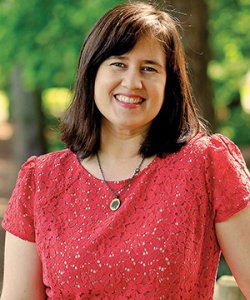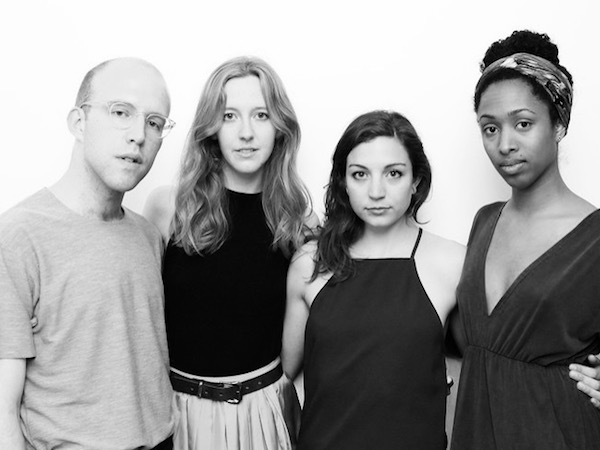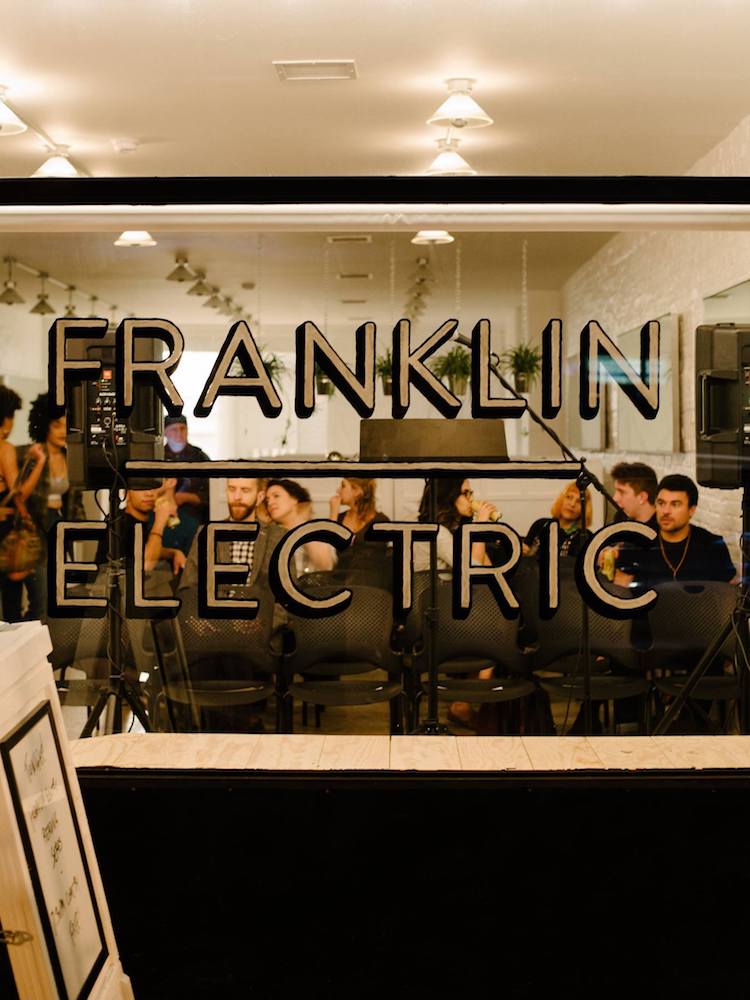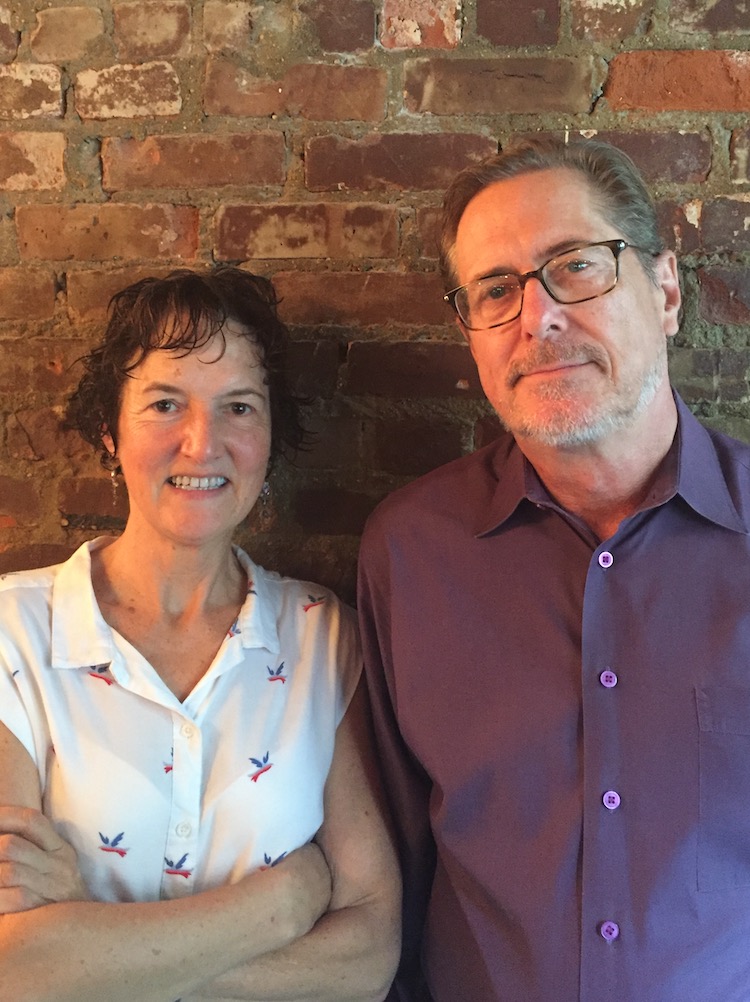Literary MagNet: Laura Da’

A poet discusses four journals that published poems from her second collection, Instruments of the True Measure.
Jump to navigation Skip to content

A poet discusses four journals that published poems from her second collection, Instruments of the True Measure.
Will Frazier is a poet whose writing has appeared in Kenyon Review Online, Washington Square Review, Cosmonauts Avenue, and No Tokens Journal. He lives in Brooklyn, New York.
 In early 2016, my friend Victoria Kornick and I wandered into an open house for a new coworking space in the Crown Heights neighborhood of Brooklyn, New York. We met the owner of Franklin Electric (now known as Work Heights), Sam Strauss-Malcolm, who expressed an interest in hosting free community events in the new space. We offered up the idea for a reading series, and in the following weeks, we kept in touch with Sam and got two other friends involved: Jordan Majewski and Jessica Modi. We all met while studying poetry as undergrads and had all ended up living in New York.
In early 2016, my friend Victoria Kornick and I wandered into an open house for a new coworking space in the Crown Heights neighborhood of Brooklyn, New York. We met the owner of Franklin Electric (now known as Work Heights), Sam Strauss-Malcolm, who expressed an interest in hosting free community events in the new space. We offered up the idea for a reading series, and in the following weeks, we kept in touch with Sam and got two other friends involved: Jordan Majewski and Jessica Modi. We all met while studying poetry as undergrads and had all ended up living in New York.
Each of us invited one writer for the inaugural reading in February of that year, and since then, the Franklin Electric Reading Series has hosted monthly readings featuring emerging and established poets, fiction writers, and essayists. Though the events have come together in a number of ways, often we’ll be in touch with one writer interested in reading, and we’ll offer them the option of inviting other writers to create a lineup. It’s become an exciting way to host writers who may be intimately involved in each other’s work—as friends or colleagues—but may have never had the chance to read together.
 Memorable moments have included a choose-your-own-adventure nonfiction performance by Kristin Dombek and Stephanie Hopkins, an evening with readings from the entire staff of No Tokens Journal, and our two-year anniversary event last winter when we invited many previous readers back for quick, two-minute readings.
Memorable moments have included a choose-your-own-adventure nonfiction performance by Kristin Dombek and Stephanie Hopkins, an evening with readings from the entire staff of No Tokens Journal, and our two-year anniversary event last winter when we invited many previous readers back for quick, two-minute readings.
Though Victoria and Jordan each recently relocated to the West Coast, Jessica and I have continued on with the series. This fall, we’ve been grateful to host many poets with new books out—Catherine Barnett, Cynthia Cruz, and Monica Ferrell. We’re also excited to introduce some new formats for the series; we’ll feature Thora Siemsen interviewing Hermione Hoby and Paul Legault on October 6, as part of PEN America’s Lit Crawl. And on October 11 we’ll hear our first musical performance ever—with Nick Flynn and his band Killdeer—as well as readings from Jennifer Franklin and Fred Marchant, which is supported by Poets & Writers’ Readings & Workshops program.
Readings typically take place on the second Thursday or Friday of the month at 7:30 PM, and always at 650 Franklin Avenue in Brooklyn, New York. For the latest, visit our Facebook page.
Support for the Readings & Workshops Program in New York City is provided, in part, by public funds from the New York State Council on the Arts, and the New York City Department of Cultural Affairs, with additional support from the Frances Abbey Endowment, the Cowles Charitable Trust, and the Friends of Poets & Writers.
Photos: (top, from left to right) Will Frazier, Victoria Kornick, Jessica Modi, and Jordan Majewski. (bottom) Franklin Electric event (Credit: Tag Christof).“It’s my lunch hour, so I go / for a walk among the hum-colored / cabs,” writes Frank O’Hara in his poem “A Step Away From Them.” So often, we miss out on the potential for inspiration from our daily routines, passing muses on morning commutes, lunch breaks, or evening strolls. This week, read O’Hara’s poem and then go out into your neighborhood with no set destination, carrying a notepad with you. Observe and write down everything and everyone you see: invent background narratives, involve your senses, and record sounds and overheard phrases. At home, write a poem that starts with the time of day (“It’s eight in the morning,” or “It’s my lunch hour,” or “It’s midnight”) and take the reader through the streets with you.
“Here at our sea-washed, sunset gates shall stand / A mighty woman with a torch...” Singer-songwriter Regina Spektor recites Emma Lazarus’s 1883 sonnet “The New Colossus,” and chats with Poetry in America television series host Elisa New about the value of poetry.
Poet Natalie Diaz, fiction and nonfiction writer John Keene, and fiction writer Kelly Link have received 2018 MacArthur “Genius” Fellowships. They will each receive $625,000 over five years. The annual grants are given to “encourage people of outstanding talent to pursue their own creative, intellectual, and professional inclinations.”
This morning the MacArthur Foundation announced the full class of twenty-five fellows, which includes artists, musicians, scientists, scholars, social advocates, and more. “Working in diverse fields, from the arts and sciences to public health and civil liberties, these twenty-five MacArthur Fellows are solving long-standing scientific and mathematical problems, pushing art forms into new and emerging territories, and addressing the urgent needs of under-resourced communities,” says Cecilia Conrad, the managing director of the fellowship program. “Their exceptional creativity inspires hope in us all.”
Poet Natalie Diaz teaches at Arizona State University and published the poetry collection When My Brother Was an Aztec (Copper Canyon, 2012). “Diaz is a powerful new poetic voice, and she is broadening the venues for and reach of Indigenous perspectives through her teaching, cross-disciplinary collaborations, and language preservation efforts,” the MacArthur Foundation says in the award announcement.
Writer John Keene is the author of several books, including the story collection Counternarratives (New Directions, 2015) and the semi-autobiographical novel Annotations (New Directions, 1995). “Through innovations in language and form, he imbues with multifaceted subjectivities those who have been denied nuanced histories within the story of the Americas—primarily people of color and queer people—and exposes the social structures that confine, enslave, or destroy them,” writes the MacArthur Foundation.
Fiction writer Kelly Link “pushes the boundaries of literary fiction in works that combine the surreal and fantastical with the concerns and emotional realism of contemporary life.” Link has published four story collections, most recently Get in Trouble (Random House, 2015). Listen to Link read an excerpt from that collection here.
Viet Thanh Nguyen and Jesmyn Ward received MacArthur grants last year, and Claudia Rankine, Maggie Nelson, and Gene Luen Yang were among the writers who won grants in 2016. Fellows are recommended by external nominations, and then chosen by an anonymous selection committee; there is no application process. Between twenty and thirty fellows are selected each year.
For a complete list of this year’s recipients and more details about the fellowships, visit the MacArthur Foundation website.
Photos: John D. & Catherine T. MacArthur Foundation
“The Poet X is my third novel, but it’s the first one published.” At the New York State Writers Institute, Elizabeth Acevedo speaks about making the transition from poetry to fiction, facing rejection, and learning to persevere in the process of publishing her first novel, The Poet X (HarperTeen, 2018), which is longlisted for the 2018 National Book Award in young people’s literature.
“We laugh and for one heartbeat forget to be afraid.” This short film of John Glenday’s poem “The Big Push” is inspired by James Herbert Gunn’s 1916 painting “The Eve of the Battle of the Somme.” Animated by Xin Li, the film was produced by the Poetry Society and Mosaic Films.
The National Cowboy Poetry Gathering has been convening in Elko, Nevada for over thirty years to highlight the “cowboy way” of life, with activities such as poetry and yodeling and sing-alongs, musical performances, dancing, and recounting tall tales and folklore. Many poems and songs that are performed describe the everyday work of ranchers, herders, and rodeo cowboys, and the wide, open spaces of the rural West landscape. Taking a cue from these themes of cowboy verse, write a poem that celebrates the simple pleasures of a work day, focusing on something mundane that brings joy, perhaps finding a way to incorporate the natural environment. Listen to a cowboy song for additional inspiration.
Sam Perkins is a freelance writer, poet, translator, and editor who has worked in magazines for two decades. His nonfiction work has appeared in the New York Times, Next Avenue, Atlas Obscura, and numerous travel magazines. His poetry translations from Chinese, done in collaboration with Joan Xie, have appeared in Exchanges: A Journal of Literary Translation and in the collection Thirteen Leaves (Three Owls Press, 2018).
 Bloom Readings is a series that takes place monthly, always on Sundays at 5:00 PM, in “The Lounge,” an elegant 1920s event space in the Hudson View Gardens apartment complex on 183rd Street and Pinehurst Avenue in New York City. As curators of Bloom, Sarah Van Arsdale and I invite writers of prose and poetry from Washington Heights and beyond to share their work.
Bloom Readings is a series that takes place monthly, always on Sundays at 5:00 PM, in “The Lounge,” an elegant 1920s event space in the Hudson View Gardens apartment complex on 183rd Street and Pinehurst Avenue in New York City. As curators of Bloom, Sarah Van Arsdale and I invite writers of prose and poetry from Washington Heights and beyond to share their work.
One of the most appealing features of Bloom is that we really aim to get the small details right: We have a printed program with suggested reading, we keep the inevitable white wine cold enough to drink without wincing, we have chips and dip, and we enlist the local bookshop co-op Word Up to sell the books of our featured readers. After the reading we go to one of the organizer’s apartments for a simple, leisurely meal.
Sarah, the Bloom team, and I want to make our readings an enjoyable, memorable moment for the readers. One of our challenges is that we’re a bit of a hike for readers coming from Brooklyn, Queens, or New Jersey. We like to think these details count. This year, thanks to Poets & Writers, we’ve been able to offer readers a small honorarium. It’s a wonderful feeling.
Bloom is proud of the roster of writers who have come to read, established voices like Rachel Hadas, Cornelius Eady, Jeanne Marie Beaumont, and Teresa Svoboda, and emerging voices like poets Rico Frederick and Sarah Jewell, and at our most recent reading, short story writer Dennis Norris II. Wherever they are in their careers, all are dedicated to their craft and calling.
For our reading on September 23, translator, scholar, and essayist Leah Souffrant read from her book, Plain Burned Things: A Poetics of the Unsayable, and performed “Thread: Attention to Loving,” a selection from her new manuscript Entanglements, which was accompanied by a video piece “Visual Entanglements 9.” Leah’s reading focused on the difficulty of expressing what is sensed but ultimately unknowable. As she read, Leah projected a series of flowing images on the wall behind her. Straddling the border between abstract and representational, the arresting video sequence reinforced and expanded the themes she tackles in her writing—the frustration and fascination we feel as writers, trying to explain the objective and subjective worlds we occupy.
Dennis Norris II read “Last Rites,” a moving, meditative short story recently published in the anthology Everyday People: The Color of Life (Atria Books, 2018) edited by Jennifer Baker. The narrative moves through the thoughts of a father, “The Reverend,” waiting to be rescued from a car crash. Toggling back and forth through time, we follow the Reverend’s memories of his son as a child, his late wife, and the demons that resurface as he tries to come to terms with his past as a husband and father. Dennis’s career is taking off. It’s a wonderful feeling to give young writers a boost.
Although Meena Alexander was unable to attend the reading, we were treated to a selection of poems from her recent collection, Atmospheric Embroidery (TriQuarterly Books, 2018), read by Leah Souffrant and Sarah Van Arsdale. Even in her absence, Meena’s words filled the room with, as she puts it in her poem “Darling Coffee,” “the periodic pleasure of small happenings.”
Interspersed with the other readers, Joan Xie, a poet who writes in Chinese and English, and I read from our recently published collaborative translation, Thirteen Leaves, an anthology of contemporary Chinese poetry. We chose poems from Lan Lan, Guma, and Arxin, none of whom are well-known in the United States but are widely recognized in China. Arxin’s poem, “Those Years on the Bank of Sanduo River,” sums up a feeling many poets and other creative writers have when they consider the writing life:
... I saw my house on the beach
— a lone cabin
surrounded, battered
by snow on all sides.
Running a monthly series takes extra work, which couldn’t be managed without our great team: Kate Hogan, Joan Greenbaum, Barbara Blatner, and Gabriella Barnstone. Together, we divide and conquer, and get it done.
This October, we have a great line-up of readers: Nathan McClain, Tishon Woolcock, Glynn Pogue, and Carol Potter. We look forward to having a great 2018–2019 season enhanced by funding provided by the Poets & Writers’ Readings & Workshops program. We’re so grateful for the support!
Support for the Readings & Workshops Program in New York City is provided, in part, by public funds from the New York State Council on the Arts, and the New York City Department of Cultural Affairs, with additional support from the Frances Abbey Endowment, the Cowles Charitable Trust, and the Friends of Poets & Writers.
Photo: Sarah Van Arsdale and Sam Perkins (Credit: Wesley Schmidt).Poet Catherine Barnett on loneliness and comedy; Oprah Winfrey to award Toni Morrison Center for Fiction’s lifetime achievement award; on having an identity outside of poetry; and other news.